The question “Does my last name decline and how?” stands before almost everyone whose last name does not end in -ov(a) or -in(a). Let's figure it out.
The declension/non-declension of a surname depends primarily on what sound (consonant or vowel, stressed or unstressed) it ends with.
All male surnames ending in a consonant (as well as ь, й) are declined (except for surnames ending in -yh, -ago, -ovo such as Chernykh, Zhivago, Durnovo), but female surnames are not (from Natalia Aleksandrovna Herzen, to Lyubov Dmitrievna Blok, about Mary Hemingway, about Zoya Gaidai).
The declension of surnames ending in vowels does not depend on whether they are masculine or feminine.
Surnames spelled with e, o, e, i, y, u, yu at the end are not declined. For example: Daudet, Musset, Lanceret, Fourier, Meyer, Chabrier, Goethe, Nobile, Tarle, Ordzhonikidze, Artman, Maigret, Grétry, Debussy, Navoi, Modigliani, Rustaveli, Lanou, Nehru, Camus, Clemenceau, Milhaud, Picasso, Marlowe.
This rule also applies to Ukrainian surnames ending in -ko: Korolenko, Makarenko, Franko, Kvitko, Semashko, Gorbatko, Gromyko.
Most difficult case– declension of surnames with final a. Unlike previous cases, here it matters which letter comes before a - a vowel or a consonant, whether the stress falls on this vowel, and what origin the surname is.
All surnames ending in a, preceded by vowels (most often y or i), are indeclinable: Galois, Maurois, Delacroix, Moravia, Eria, Heredia, Gulia.
Surnames of French origin do not incline to the accented a: Dumas, Thomas, Fermat, Petipa. Surnames of other origins (Slavic, from eastern languages) are declined: Mitta - Mitty, Mitte, Mittu, Mittoy; These include: Frying pan, Poker, Kvasha, Tsadasa, Hamza, etc.
All surnames ending in an unstressed word and after consonants are declined: Ribera - Ribera, Ribera, Ribera, Ribera; Kafka, Spinoza, Smetana, Petrarch, Kurosawa, Glinka, Deineka, Gulyga, Olesha, Okudzhava and others are also inclined.
The indeclinability/indeclinability of surnames written with the letter I at the end depends on the place of emphasis: surnames of French origin with an emphasis on the end are indeclinable: Zola, Troyat, all others are indeclinable (Golovnya, Zozulya, Syrokomlya, Gamaleya, Goya, Shengelaya, Danelia, Beria.
Letterman
Names and titles
How to decline surnames (difficult cases)
Source:N. A. Eskova. Difficulties in inflecting nouns. Educational materials for practical classes in the course “Language of Modern Printing”. State Press Committee of the USSR. All-Union Institute for Advanced Training of Print Workers. M., 1990.
13.0. This issue dedicated to the book by L.P. Kalakutskaya “Declination of surnames and personal names in Russian literary language" M., 1984. This basic research based on rich material. This section briefly discusses only the main issues, focusing on the most complex and controversial ones. Last names and first names are considered separately.
13.1. Declension of surnames
13.1.1. The vast majority of Russian surnames have formal indicators - suffixes -ov- (-ev-), -in-, -sk-: Lermontov, Turgenev, Pushkin, Dostoevsky, Kramskoy. All such surnames are declined. At the same time, they form two correlative systems of forms - masculine and feminine, naming respectively male and female persons. Both systems are associated with a single system of plural forms.
Note. All this - with the exception of the absence of neuter forms - resembles a system of adjective forms. Absolute regularity in the ratio
male and female surnames, which have no analogues among common nouns, suggests whether surnames should not be considered a special type of “gender-inflected” nouns.
13.1.2. Surnames with a formal indicator -sk- Declined in the masculine and feminine gender and in the plural as adjectives: Dostoevsky, Dostoevsky, Dostoevsky..., Dostoevskaya, Dostoevsky..., Dostoevsky, Dostoevsky etc.
Russian surnames inflected as adjectives and without an indicator -sk-, relatively few in number; These include: Blagoy, Tolstoy, Borovoy, Beregovoy, Lanovoy, Bronevoy, Wild, Smooth, Transverse etc. (see the list of such surnames in the book: A.V. Superanskaya, A.V. Suslova. Modern Russian surnames. M., 1981. P. 120-122).
13.1.3. Last names with indicators -ov- And -in- have in masculine a special declension not found either among personal names or common nouns. It combines the endings of second declension nouns male and adjectives like fathers. The declension of surnames differs from the declension of the indicated nouns by the ending of the instrumental case (cf.: Koltsov-ym, Nikitin-yy - island-yy, jug-yy), from the declension of possessive adjectives - ending prepositional case(cf.: about Griboyedov, about Karamzin - about fathers, about mothers).
Correlative female surnames are declined as possessive adjectives in the feminine form (cf. as they are declined Rostov And father, Karenina And mom's).
The same must be said about the declination of surnames -s And -in in plural (Bazarovs, Rudins bow like fathers, mothers).
13.1.4. All other male surnames that have consonant stems and a zero ending in the nominative case (in writing they end with a consonant, b or th), except for last names -s, -them, are declined as nouns of the second declension of the masculine gender, i.e. they have an ending in the instrumental case -om, (s): Herzen, Levitan, Gogol, Vrubel, Hemingway, Gaidai. Such surnames are perceived as “non-Russian”.
Correlative female surnames are not declined: Natalia Alexandrovna Herzen, Lyubov Dmitrievna Blok, with Anna Magdalena Bach, with Nadezhda Ivanovna Zabela-Vrubel, about Mary Hemingway, about Zoya Gaidai.
Note. The application of this rule requires knowledge of the gender of the bearer of the surname. The absence of such information puts the writer in a difficult position.
The form containing the last name indicates the gender of the person concerned. But if the author of the text did not have the necessary information, was unsteady in applying the grammatical rule, or was simply careless, the reader receives false information. Let's give one example. In the weekly “Moscow Speaks and Shows” radio programs on 9.3.84 featured the following program: “E. Mathis sings. The program includes songs by W. Mozart, K. Schumann, J. Brahms, R. Strauss.” Who is K. Schumann? It can be assumed that the initial is indicated incorrectly: K. Instead of R. But it turns out that songs were performed in the program Clara Schumann(wife of Robert Schumann, who was not only a pianist, but also a composer). This is how a grammatical error confuses the reader.
In the plural, surnames of the type in question are also declined as masculine nouns: visited the Herzens, the Vrubels, the Gaidais, wrote to the Bloks, the Hemingways and so on.
Note. There are, however, special rules for placing such surnames in some cases in the indeclinable plural form, in others - in the indeclinable form. These rules, more related to syntax than to morphology, are developed in some detail by D. E. Rosenthal (see: Handbook of Spelling and Literary Editing. M., 1989. P. 191-192, §149, paragraph 10) . In accordance with these rules, it is recommended: with Thomas and Heinrich Mann, But with Robert and Clara Schumann, with the Oistrakh father and son, But father and daughter Gilels. This material is not discussed here.
13.1.5. Implied in the previous paragraph simple rule Declension of surnames into consonants that do not have formal indicators -in-, -ov-, turns out to be difficult to apply for some “outlandish” surnames, for example, for those that are homonymous with a common noun or geographical names, inclined according to the third declension. Thus, in the grammatical appendix to the “Directory of Personal Names of the Peoples of the RSFSR”, difficulties are noted that arise when it is necessary to decline such surnames as Sadness, Love, Astrakhan.
The same manual states that for some surnames, only the formation of the plural is associated with difficulties (surnames Mustache, Gay, Finger, Snake, Sleep and etc.).
Declension of a number of surnames (both singular and plural) turns out to be difficult due to the uncertainty whether they should retain the fluency of vowels in the manner of homonymous or similar in appearance common nouns (Kravets or Kravets - from Kravets, Zhuravelya or Crane - from Zhuravel, Mazuroka or Mazurka - from Mazurok and so on.).
The resolution of such difficulties cannot be provided by rules; for this, a dictionary of surnames is needed, giving normative recommendations for each word.
13.1.6. A special type is represented by Russian surnames in -s(s), revealing their origin from the genitive (and prepositional) plural form of adjectives: White, Black, Curly, Curly, Long, Red. According to the strict norms of literary language, such surnames are not declined: Chernykh's lectures, Sedykh's novel, Kruchenykh's works and so on.
Note. In casual conversation there is a tendency to inflect such surnames when they belong to men, current topic stronger, the closer the communication with the bearer of the surname. Thus, in the now defunct Moscow City Pedagogical Institute. Potemkin students of the forties and fifties listened to lectures Chernykha, passed exams and tests Chernykh and so on. (it never occurred to anyone to say otherwise). If this colloquial trend prevailed, the surnames on -y, -them would cease to differ from other surnames by the consonants mentioned in paragraph 13.1.4.
13.1.7. There are cases when the original form of a surname can be perceived ambiguously from the point of view of its morphological structure. These cases are few in number, but they are interesting both linguistically and from the point of view of the practical difficulties that may be associated with them.
There is a problem of distinguishing between “Russian” and “non-Russian” surnames -s And -in; the latter include, for example, Fleets(German composer), Gutskov(German writer) Cronin(English writer), Darwin, Franklin etc. From a morphological point of view, “Russianness” or “non-Russianness” is expressed in whether a formal indicator stands out or not in the surname ( -ov- or -in-). If such an indicator stands out, then the instrumental case has the ending -th, and the correlative female surname declines (Fonvizin, Fonvizina), if it does not stand out, the instrumental case is formed with the ending -oh, and a woman's surname does not decline (Virchow, with Anna Virchow). Wed. "homonyms": Charles Spencer Chaplin, Hannah Chaplin And Nikolai Pavlovich Chaplin, with Vera Chaplina.
Note. As the material of L.P. Kalakutskaya shows, in some cases, correlative male and female surnames are formed morphologically contradictory (for example, the instrumental case Tseytlin can be combined with a non-bending shape Tseytlin female surname). Complete ordering here can only be achieved if there is special dictionary surnames containing grammatical instructions. However, the editor must ensure that morphologically contradictory forms do not occur at least within the same text.
There are non-Russian (mostly German) surnames on -them: Argerich, Dietrich, Freundlich, Ehrlich etc. Regardless of their characteristic “foreign language” touch, they cannot be mistaken for Russian surnames -their because in Russian surnames before the element -their There are practically no soft consonants with hard pairs, since in Russian there are few adjectives with such stems (i.e. adjectives such as blue; and is there a last name? Blue and others like it?).
But if the end -their the surname is preceded by a sibilant or velar consonant; its belonging to the indeclinable type will be undoubted only if it is correlated with the stem of the adjective (for example, Walking, Smooth); in the absence of this condition, such surnames can be perceived morphologically ambiguous; these include, for example, Khashachikh, Tovchikh, Gritskikh. Despite the rarity of such cases, this fundamental possibility should be kept in mind.
In very rare cases, surnames whose original forms end in iota may be perceived ambiguously (in writing j) with preceding vowels And or O. For example, names such as Topchiy, Pobozhiy, Bokiy, Rudoy can also be perceived as having endings -yy, -yy and therefore inflected as adjectives (Topchego, Topchego..., feminine Topchaya, Topchey) and as having a zero ending with declension like nouns (Topchia, Topchia..., in the feminine gender the unchangeable form Topchiy). To resolve such perplexities, a dictionary of surnames is again needed.
13.1.8. The declension of surnames ending in vowels in their original form does not depend on whether they are masculine or feminine.
Note. Material by L.P. Kalakutskaya shows that there is a tendency to extend the relationship that is natural for surnames with consonants to surnames with a final A, i.e. decline male surnames without declining female ones. Editors should do their best to eliminate this practice.
Let's look at surnames based on vowels, based on their letter appearance.
13.1.9. Surnames spelled with e, e, i, s, y, yu at the end, can only be inflexible. These are the names: Daudet, Musset, Lanceret, Fourier, Meillet, Chabrier, Goethe, Nobile, Caragiale, Tarle, Ordzhonikidze, Artman, Maigret, Bossuet, Grétry, Lully, Debussy, Navoi, Modigliani, Gramsci, Galsworthy, Shelley, Rustaveli, Chabukiani, Gandhi, Djusoity, Needly, Lanu, Amadou, Shaw, Manzu, Nehru, Enescu, Camus, Cornu and so on.
13.1.10. Surnames with ending O also inflexible; those are the names Hugo, Clemenceau, La Rochefoucauld, Milhaud, Picasso, Marlowe, Chamisso, Caruso, Leoncavallo, Longfellow, Craft, Dolivo, Durnovo, Khitrovo, Burago, Mertvago.
According to the strict norms of the literary language, this also applies to surnames of Ukrainian origin with the final -ko(among which there are many on -enko): Korolenko, Makarenko, Franko, Kvitko, Shepitko, Bondarso, Semashko, Gorbatko, Gromyko.
Note. It is known that in the literary language of the last century such surnames could be declined according to the first declension: Korolenki, Korolenke, Korolenkoy. This is no longer considered normative.
13.1.11. The most complex picture is presented by surnames with the final A. Unlike previous cases, what matters here is whether A after a vowel or after a consonant, whether this vowel is stressed and (in certain cases) what origin the surname has.
All surnames ending with A, preceded by vowels (usually at or And), adamant: Galois, Maurois, Delacroix, Moravia, Eria, Heredia, Gulia.
All surnames ending in unstressed A after consonants, they are declined according to the first declension: Ribera - Ribera, Ribera, Ribera, Riberoi, Seneca - Seneca etc.; also inclined Kafka, Spinoza, Smetana, Petrarch, Kurosawa, Glinka, Deineka, Gulyga, Olesha, Nagnibeda, Okudzhava etc. All such surnames, regardless of origin, are morphologically distinct in the Russian language, i.e., the ending is distinguished in them -A.
Among surnames with an accent á after consonants there are both morphologically segmented and indivisible, i.e. indeclinable.
Undecidable surnames of French origin: Dumas, Thomas, Degas, Luc, Fermat, Gamarra, Petipa and etc.
Surnames of other origins (Slavic, from eastern languages) are declined according to the first declension, i.e. they have a stressed ending -a: Mitta - Mitty, Mitte, Mittu, Mittoy; these include: Frying pan, Poker, Kvasha, Tsadasa, Hamza and etc.
13.1.12. Declinability-indeclinability of surnames spelled with a letter I at the end, depends only on the place of emphasis and the origin of the surname.
Undecidable surnames of French origin with an accent on the end: Zola, Troyat.
All other surnames I inflected; these are Golovnya, Zozulya, Syrokomlya, Gamaleya, Goya, Shengelaya, Danelia, Beria.
Note. Surnames with a final letter I preceded by a vowel letter, unlike such surnames starting with a, they are divided into a stem ending with a consonant iot, and the ending -a (Gamaleya - Gamale "j-a).
Georgian surnames turn out to be indeclinable or indeclinable depending on the form in which a particular surname is borrowed into the Russian language: surnames in -and I inclined (Danelia), on -ia- inflexible (Gulia).
13.1.13. The question of the formation of the plural from declined surnames is of interest. -and I). In the grammatical appendix to the “Directory of Personal Names of the Peoples of the RSFSR” such surnames are qualified as non-standard and for them it is recommended as a norm to use the plural for all cases of a form that matches the original one. Last names were taken as samples Winter And Zoya. Recommended: Ivan Petrovich Zima, with Semyon Semenovich Zoya, Anna Ivanovna Zima, Elena Sergeevna Zoya etc., and for the plural - forms Winter, Zoya in all cases.
Imagine the declination of plural surnames Winter, Zoya really difficult. But what about other first declension surnames, for example, such as Glinka, Deineka, Gulyga, Okudzhava, Olesha, Zozulya, Gamaleya? Is there any certainty that for them it should be recommended to use in all cases the plural form that coincides with the original one? How to say: to his beloved Glinka or to your beloved Glinka?; met with Deineka or met with the Deineks?; remembered everyone Okudzhava or remembered all the Okudzhavas? The use of inflected forms in these cases is not excluded.
It is more difficult to imagine the declension in the plural of surnames with a stressed ending -á - Shulga, Mitta, Hamza, especially in genitive case (everyone has *Shulg, *Mitt, *Hamz?). Here we are faced with a language difficulty (see above, 7.6.). Since such facts are rare and have not been studied by linguists, in such cases it is advisable for the editor to minimally interfere with the author’s text.
13.2. Declension of personal names
13.2.1. Personal names do not have significant morphological differences from common nouns. They are not “gene-modifying” (clearly, cases like Alexander And Alexandra, Evgeniy And Evgenia, Valery And Valeria do not apply to this phenomenon). Among personal names there are no words with a special declension (cf. what was said above about surnames in -s And -in). The only peculiarity of personal names is the absence of neuter words among them, but it should be noted that among animate common nouns the neuter gender is represented very little.
13.2.2. Among personal names there is a third declension noun. This is also a feature that brings them morphologically closer to common nouns and distinguishes them from surnames. According to the third declension, they are steadily declined: Love(with forms Love, O Love), Adele, Gisele and names biblical origin Hagar, Rachel, Ruth, Shulamith, Esther, Judith. Other names of this type - Lucille, Cecile, Aigul, Gazelle(borrowing from different languages), Ninel(neoplasm Soviet era), Assol(invented name) - fluctuate between the third declension and indeclination (from Cecily And at Cecile's, with Ninel And with Ninel).
Note. Female surnames with soft consonants (in writing in b), how it is clear from what was said above (see 13.1.4), they are just as indeclinable as female surnames with hard consonants. The fundamentally existing possibility of parallel change of nouns into soft consonants in two different declensions for the grammatical expression of gender differences remains unrealized in the Russian language. Wed. theoretically possible relationships: Vrubel, Vrubel, Vrubel(declension of male surname) - *Vrubel, *Vrubel(declension of a female surname), *trot, *trot, *trot(declension of the name of the male) -trot, trot(declension of the name of the female). However, in the famous folklore Swans This opportunity is partly being realized!
13.2.3. Female names with strong consonants can only be indeclinable (no different from surnames of this kind). These include: Elizabeth, Irene, Catherine, Gretchen, Liv, Solveig, Marlene, Jacqueline and so on. There are common nouns of this type, but they are few in number and practically incomplete (madam, miss, missus, mistress, fraulein, miss), There are many personal names and their replenishment (by borrowing) is not limited by anything.
13.2.4. Male names with hard and soft consonants (written with consonants, And And b), declined as common nouns of the same appearance. These include Ivan, Konstantin, Makar, Arthur, Robert, Ernst, Claude, Richard, Andrey, Vasily, Julius, Amadeus, Igor, Emil, Charles etc. In rare cases of “homonymy” of male and female names, they are correlated (in terms of declension) as male and female surnames: Michelle, Michelle(male name), Michelle, indeclinable (female name; there is a French violinist Michel Auclair).
13.2.5. Everything that has been said about the inclination and indeclinability of surnames to vowels also applies to personal names.
Names are not declined: Rene, Roger, Honore, Jose, Ditte, Oze, Pantalone, Henri, Louis, Lisi, Betsy, Giovanni, Mary, Eteri, Givi, Pierrot, Leo, Amadeo, Romeo, Carlo, Laszlo, Bruno, Hugo, Danko, Francois, Nana, Atala, Colomba and so on.
Declining names: Francoise, Juliet, Suzanne, Abdullah, Mirza, Musa, Casta, Emilia, Ophelia, Jamila and so on.
13.2.6. The plural of inflected personal names is formed freely if this: becomes necessary: Ivana, Igori, Emily, Elena, Emilia etc. Morphological restrictions arise here in the same cases as for common nouns (for example, for the genitive plural from Abdullah, Mirza, Costa; Wed 7.6). On the variant formation of the genitive plural from names of type Petya, Valya, Seryozha see 7.4.4, note.
13.3 Features of the formation of indirect cases from certain combinations of first and last names
In the Russian language, a tradition has developed of using the surnames of a number of foreign figures (mainly writers) in combination with given names: Walter Scott, Jules Verne, Mine Reed, Conan Doyle, Bret Harte, Oscar Wilde, Romain Rolland; Wed Also literary characters: Robin Hood, Sherlock Holmes, Nat Pinkerton. The use of these surnames separately, without names, is not very common (this is especially true for monosyllabic surnames; hardly anyone read in childhood Verne, Reed, Doyle And Scott!).
The consequence of such close unity of the name and surname is the declension in indirect cases of only the surname: Walter Scott, Jules Verno, with Mayne Reid, about Robin Hood and so on. This is a phenomenon characteristic of casual oral speech, is reflected in the letter, which can be confirmed the following examples from fairly authoritative authors.
Show yourself off like a wonderful beast,
He is now going to Petropol /.../
With Gizot's terrible book,
With a notebook of evil cartoons,
With a new novel Walter-Scott...
(Pushkin. Count Nulin)
And gets up
live
Fenimore's country
Cooper
And Main-Rida.
(Mayakovsky. Mexico)
In the evenings the quick-eyed Chamois
Reads to Vanya and Lyala Jules Verne.
(Chukovsky. Crocodile)
(Writings with a hyphen emphasize the close unity of the first and last names).
Failure to inflect a name in such combinations is condemned by modern normative manuals. So, D. E. Rosenthal says: “... novels Jules Verne(not: “Jules Verne”)...” (Op. cit. P. 189. §149, paragraph 2).
The wind whistled past Vova's ear
And he tore the sombrero off his head!
Wave-mountains run after each other,
They gallop like maned lions.
Here, with a hiss, one rolled -
AND Jules Verne picked it up from the stern!
(Volgina T. Summer wanders along the paths. Kyiv. 1968. P. 38-39).
Such an edit in poetry is, of course, completely unacceptable. But also in a prose text that conveys a relaxed colloquial speech, no need to replace Jules Verne, Mine Ride, Bret Harte, Conan Doyle etc. with strictly normative combinations with inflected forms of names. The editor should similar cases show flexibility.
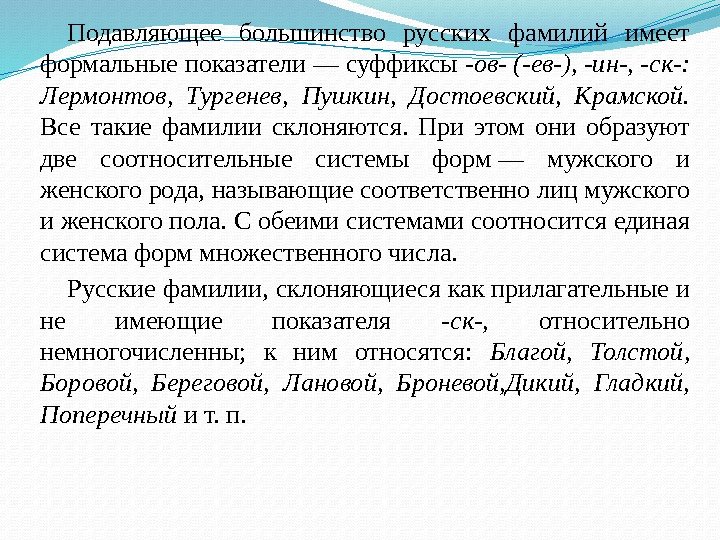 The vast majority of Russian surnames have formal indicators - the suffixes -ov- (-ev-), -in-, -sk-: Lermontov, Turgenev, Pushkin, Dostoevsky, Kramskoy. All such surnames are declined. At the same time, they form two correlative systems of forms - masculine and feminine, naming respectively male and female persons. Both systems are associated with a single system of plural forms. Russian surnames inflected as adjectives and without the indicator -sk- are relatively few in number; these include: Blagoy, Tolstoy, Borovoy, Beregovoy, Lanovoy, Bronevoy, Wild, Gladky, Transverse, etc.
The vast majority of Russian surnames have formal indicators - the suffixes -ov- (-ev-), -in-, -sk-: Lermontov, Turgenev, Pushkin, Dostoevsky, Kramskoy. All such surnames are declined. At the same time, they form two correlative systems of forms - masculine and feminine, naming respectively male and female persons. Both systems are associated with a single system of plural forms. Russian surnames inflected as adjectives and without the indicator -sk- are relatively few in number; these include: Blagoy, Tolstoy, Borovoy, Beregovoy, Lanovoy, Bronevoy, Wild, Gladky, Transverse, etc.
 Surnames with the indicators -ov- and -in- have a special declension in the masculine gender, which is not found either among personal names or among common nouns. It combines the endings of second declension masculine nouns and father-type adjectives. The declension of surnames differs from the declension of the indicated nouns by the ending of the instrumental case (cf.: Koltsov-ym, Nikitin-ym - island-om, jug-om), from the declension of possessive adjectives - by the ending of the prepositional case (cf.: o Griboedov-e, o Karamzin -e - about fathers, about mothers).
Surnames with the indicators -ov- and -in- have a special declension in the masculine gender, which is not found either among personal names or among common nouns. It combines the endings of second declension masculine nouns and father-type adjectives. The declension of surnames differs from the declension of the indicated nouns by the ending of the instrumental case (cf.: Koltsov-ym, Nikitin-ym - island-om, jug-om), from the declension of possessive adjectives - by the ending of the prepositional case (cf.: o Griboedov-e, o Karamzin -e - about fathers, about mothers).
 Correlative female surnames are declined as possessive adjectives in the feminine form (cf. Rostova and Father's, Karenina and Mother's are declined). The same must be said about the declination of surnames into -ov and -in in the plural (Bazarovs, Rudins are declined as father's, mother's). All other male surnames that have stems with consonants and a zero ending in the nominative case (in writing they end with a consonant letter, ь or й), except for surnames with -y, -i, are declined as nouns of the second declension of the masculine gender, i.e. have in the instrumental case the ending is -om, (-em): Herzen, Levitan, Gogol, Vrubel, Hemingway, Gaidai. Such surnames are perceived as “non-Russian”.
Correlative female surnames are declined as possessive adjectives in the feminine form (cf. Rostova and Father's, Karenina and Mother's are declined). The same must be said about the declination of surnames into -ov and -in in the plural (Bazarovs, Rudins are declined as father's, mother's). All other male surnames that have stems with consonants and a zero ending in the nominative case (in writing they end with a consonant letter, ь or й), except for surnames with -y, -i, are declined as nouns of the second declension of the masculine gender, i.e. have in the instrumental case the ending is -om, (-em): Herzen, Levitan, Gogol, Vrubel, Hemingway, Gaidai. Such surnames are perceived as “non-Russian”.
 Correlative female surnames are not declined: Natalia Aleksandrovna Herzen, Lyubov Dmitrievna Blok, with Anna Magdalena Bach, with Nadezhda Ivanovna Zabela-Vrubel, about Mary Hemingway, about Zoya Gaidai. Note. The application of this rule requires knowledge of the gender of the bearer of the surname. The absence of such information puts the writer in a difficult position. The form containing the last name indicates the gender of the person concerned. But if the author of the text did not have the necessary information, was unsteady in applying the grammatical rule, or was simply careless, the reader receives false information.
Correlative female surnames are not declined: Natalia Aleksandrovna Herzen, Lyubov Dmitrievna Blok, with Anna Magdalena Bach, with Nadezhda Ivanovna Zabela-Vrubel, about Mary Hemingway, about Zoya Gaidai. Note. The application of this rule requires knowledge of the gender of the bearer of the surname. The absence of such information puts the writer in a difficult position. The form containing the last name indicates the gender of the person concerned. But if the author of the text did not have the necessary information, was unsteady in applying the grammatical rule, or was simply careless, the reader receives false information.
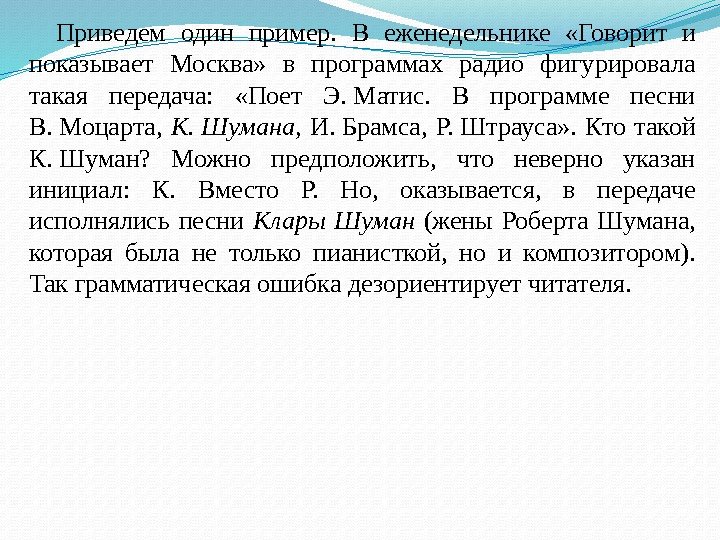 Let's give one example. In the weekly magazine “Moscow Speaks and Shows” the following program appeared in the radio programs: “E. Mathis sings. The program includes songs by W. Mozart, K. Schumann, J. Brahms, R. Strauss.” Who is K. Schumann? It can be assumed that the initial is indicated incorrectly: K. Instead of R. But it turns out that the songs of Clara Schumann (the wife of Robert Schumann, who was not only a pianist, but also a composer) were performed in the program. This is how a grammatical error confuses the reader.
Let's give one example. In the weekly magazine “Moscow Speaks and Shows” the following program appeared in the radio programs: “E. Mathis sings. The program includes songs by W. Mozart, K. Schumann, J. Brahms, R. Strauss.” Who is K. Schumann? It can be assumed that the initial is indicated incorrectly: K. Instead of R. But it turns out that the songs of Clara Schumann (the wife of Robert Schumann, who was not only a pianist, but also a composer) were performed in the program. This is how a grammatical error confuses the reader.
 In the plural, surnames of the type in question are also declined as masculine nouns: visited the Herzens, the Vrubels, the Gaidaevs, wrote to the Bloks, Hemingways, etc. Note. There are, however, special rules for placing such surnames in some cases in the indeclinable plural form, and in others in the indeclinable form. The simple rule laid down in the previous paragraph for declension of surnames into consonants that do not have formal indicators -in-, -ov-, turns out to be difficult to apply for some “outlandish” surnames, for example, for those that are homonymous with common nouns or geographical names inflected in the third declension.
In the plural, surnames of the type in question are also declined as masculine nouns: visited the Herzens, the Vrubels, the Gaidaevs, wrote to the Bloks, Hemingways, etc. Note. There are, however, special rules for placing such surnames in some cases in the indeclinable plural form, and in others in the indeclinable form. The simple rule laid down in the previous paragraph for declension of surnames into consonants that do not have formal indicators -in-, -ov-, turns out to be difficult to apply for some “outlandish” surnames, for example, for those that are homonymous with common nouns or geographical names inflected in the third declension.
 The declension of a number of surnames (both singular and plural) turns out to be difficult due to the uncertainty whether they should retain the fluency of vowels on the model of homonymous or similar in appearance common nouns (Kravets or Kravets - from Kravets, Zhuravel or Zhuravl - from Zhuravel, Mazurok or Mazurka - from Mazurka, etc.). The resolution of such difficulties cannot be provided by rules; for this, a dictionary of surnames is needed, giving normative recommendations for each word.
The declension of a number of surnames (both singular and plural) turns out to be difficult due to the uncertainty whether they should retain the fluency of vowels on the model of homonymous or similar in appearance common nouns (Kravets or Kravets - from Kravets, Zhuravel or Zhuravl - from Zhuravel, Mazurok or Mazurka - from Mazurka, etc.). The resolution of such difficulties cannot be provided by rules; for this, a dictionary of surnames is needed, giving normative recommendations for each word.
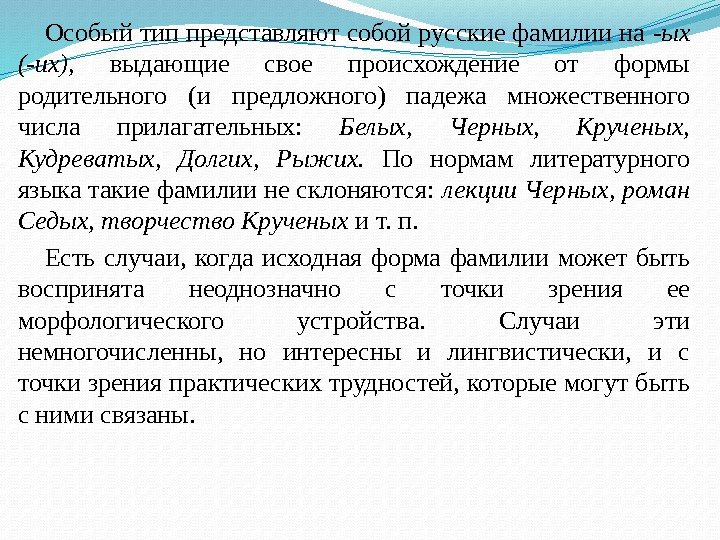 A special type is represented by Russian surnames in -yh(s), which reveal their origin from the genitive (and prepositional) case of the plural of adjectives: White, Black, Kruchenykh, Kudrevatykh, Dolgikh, Ryzhikh. According to the norms of literary language, such surnames are not declined: Chernykh’s lectures, Sedykh’s novel, Kruchenykh’s work, etc. There are cases when the original form of a surname can be perceived ambiguously from the point of view of its morphological structure. These cases are few in number, but they are interesting both linguistically and from the point of view of the practical difficulties that may be associated with them.
A special type is represented by Russian surnames in -yh(s), which reveal their origin from the genitive (and prepositional) case of the plural of adjectives: White, Black, Kruchenykh, Kudrevatykh, Dolgikh, Ryzhikh. According to the norms of literary language, such surnames are not declined: Chernykh’s lectures, Sedykh’s novel, Kruchenykh’s work, etc. There are cases when the original form of a surname can be perceived ambiguously from the point of view of its morphological structure. These cases are few in number, but they are interesting both linguistically and from the point of view of the practical difficulties that may be associated with them.
 There is a problem of distinguishing between “Russian” and “non-Russian” surnames in -ov and -in; the latter include, for example, Flotow (German composer), Gutzkow (German writer), Cronin (English writer), Darwin, Franklin, etc. From a morphological point of view, “Russianness” or “non-Russianness” is expressed in whether one stands out or not the formal indicator (-ov- or -in-) stands out in the surname.
There is a problem of distinguishing between “Russian” and “non-Russian” surnames in -ov and -in; the latter include, for example, Flotow (German composer), Gutzkow (German writer), Cronin (English writer), Darwin, Franklin, etc. From a morphological point of view, “Russianness” or “non-Russianness” is expressed in whether one stands out or not the formal indicator (-ov- or -in-) stands out in the surname.
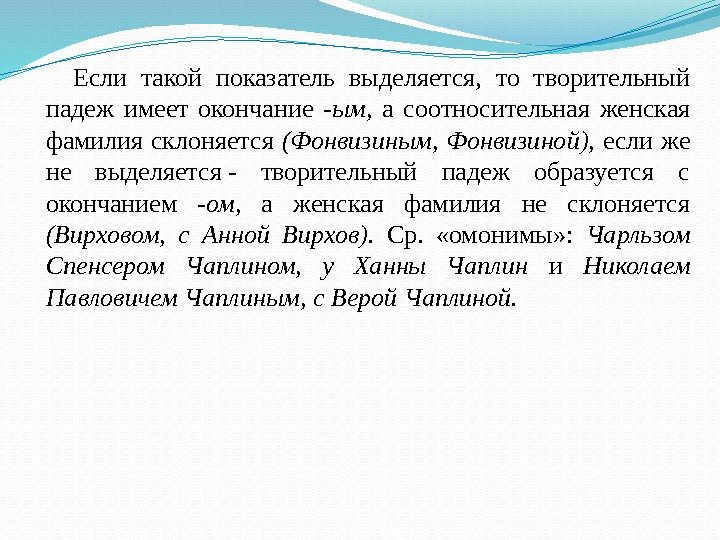 If such an indicator is highlighted, then the instrumental case has the ending -om, and the correlative female surname is declined (by Fonvizin, Fonvizina), but if it is not highlighted, the instrumental case is formed with the ending -om, and the female surname is not declined (by Virkhov, with Anna Virkhov). Wed. “Homonyms”: Charles Spencer Chaplin, with Hannah Chaplin and Nikolai Pavlovich Chaplin, with Vera Chaplin.
If such an indicator is highlighted, then the instrumental case has the ending -om, and the correlative female surname is declined (by Fonvizin, Fonvizina), but if it is not highlighted, the instrumental case is formed with the ending -om, and the female surname is not declined (by Virkhov, with Anna Virkhov). Wed. “Homonyms”: Charles Spencer Chaplin, with Hannah Chaplin and Nikolai Pavlovich Chaplin, with Vera Chaplin.
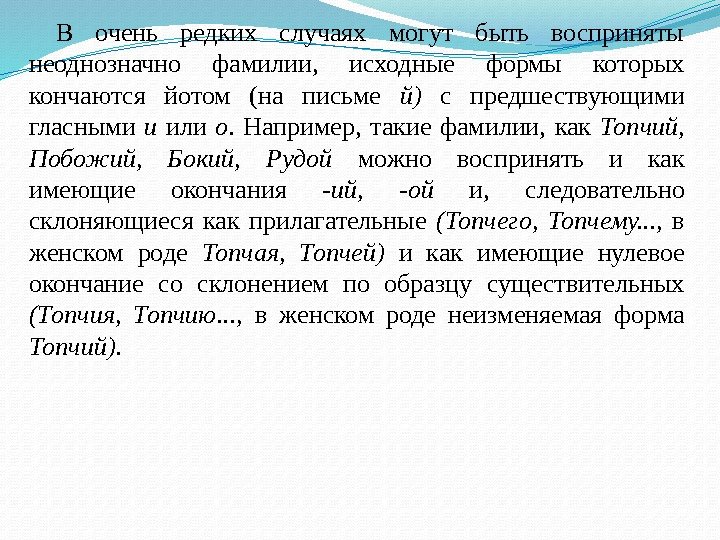 In very rare cases, surnames whose original forms end in iot (in the letter y) with preceding vowels and or o may be perceived ambiguously. For example, such surnames as Topchiy, Pobozhiy, Bokiy, Rudoy can be perceived both as having the endings -й, -ой and, therefore, inflected as adjectives (Topchego, Topchemu..., in the feminine form Topchaya, Topchey) and as having a zero ending with declension modeled on nouns (Topchiya, Topchiyu..., in the feminine gender the unchangeable form Topchiy).
In very rare cases, surnames whose original forms end in iot (in the letter y) with preceding vowels and or o may be perceived ambiguously. For example, such surnames as Topchiy, Pobozhiy, Bokiy, Rudoy can be perceived both as having the endings -й, -ой and, therefore, inflected as adjectives (Topchego, Topchemu..., in the feminine form Topchaya, Topchey) and as having a zero ending with declension modeled on nouns (Topchiya, Topchiyu..., in the feminine gender the unchangeable form Topchiy).
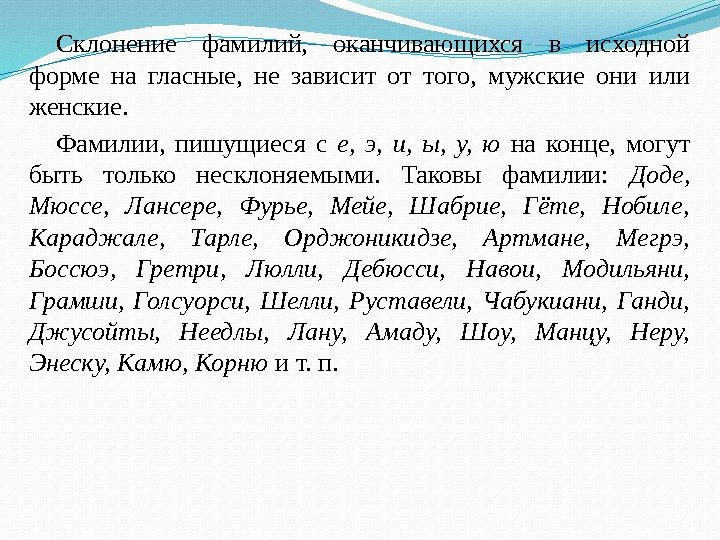 The declension of surnames ending in vowels in their original form does not depend on whether they are masculine or feminine. Surnames spelled with e, e, i, y, u, yu at the end can only be indeclinable. These are the surnames: Daudet, Musset, Lanceret, Fourier, Meillet, Chabrier, Goethe, Nobile, Caragiale, Tarle, Ordzhonikidze, Artmane, Maigret, Bossuet, Grétry, Lully, Debussy, Navoi, Modigliani, Gramsci, Galsworthy, Shelley, Rustaveli, Chabukiani , Gandhi, Djusoity, Needly, Lanou, Amadou, Shaw, Manzu, Nehru, Enescu, Camus, Cornu, etc.
The declension of surnames ending in vowels in their original form does not depend on whether they are masculine or feminine. Surnames spelled with e, e, i, y, u, yu at the end can only be indeclinable. These are the surnames: Daudet, Musset, Lanceret, Fourier, Meillet, Chabrier, Goethe, Nobile, Caragiale, Tarle, Ordzhonikidze, Artmane, Maigret, Bossuet, Grétry, Lully, Debussy, Navoi, Modigliani, Gramsci, Galsworthy, Shelley, Rustaveli, Chabukiani , Gandhi, Djusoity, Needly, Lanou, Amadou, Shaw, Manzu, Nehru, Enescu, Camus, Cornu, etc.
 Surnames with a final o are also indeclinable; These are the names of Hugo, Clemenceau, La Rochefoucauld, Milhaud, Picasso, Marlowe, Chamisso, Caruso, Leoncavallo, Longfellow, Craft, Dolivo, Durnovo, Khitrovo, Burago, Mertvago. According to the norms of the literary language, this also applies to surnames of Ukrainian origin with the final -ko (among which there are many in -enko): Korolenko, Makarenko, Franko, Kvitko, Shepitko, Bondarko, Semashko, Gorbatko, Gromyko.
Surnames with a final o are also indeclinable; These are the names of Hugo, Clemenceau, La Rochefoucauld, Milhaud, Picasso, Marlowe, Chamisso, Caruso, Leoncavallo, Longfellow, Craft, Dolivo, Durnovo, Khitrovo, Burago, Mertvago. According to the norms of the literary language, this also applies to surnames of Ukrainian origin with the final -ko (among which there are many in -enko): Korolenko, Makarenko, Franko, Kvitko, Shepitko, Bondarko, Semashko, Gorbatko, Gromyko.
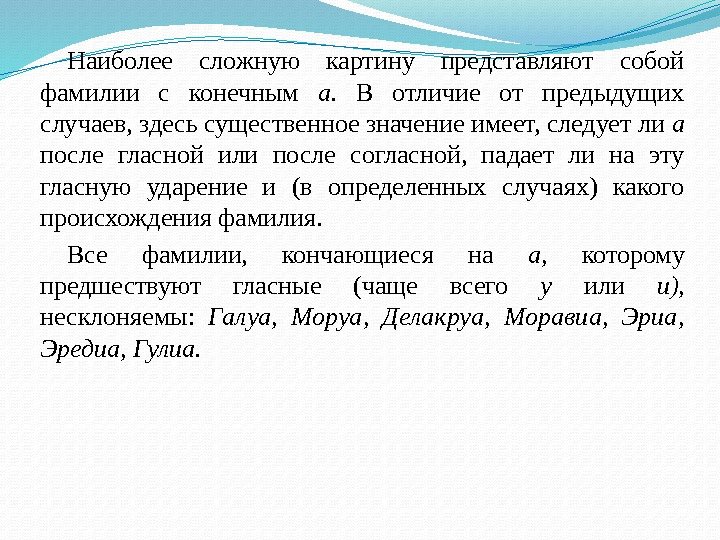 The most complex picture is presented by surnames with the final a. Unlike previous cases, here it is essential whether a follows a vowel or after a consonant, whether this vowel is stressed and (in certain cases) what origin the surname has. All surnames ending in a, preceded by vowels (most often y or i), are indeclinable: Galois, Maurois, Delacroix, Moravia, Heredia, Gulia.
The most complex picture is presented by surnames with the final a. Unlike previous cases, here it is essential whether a follows a vowel or after a consonant, whether this vowel is stressed and (in certain cases) what origin the surname has. All surnames ending in a, preceded by vowels (most often y or i), are indeclinable: Galois, Maurois, Delacroix, Moravia, Heredia, Gulia.
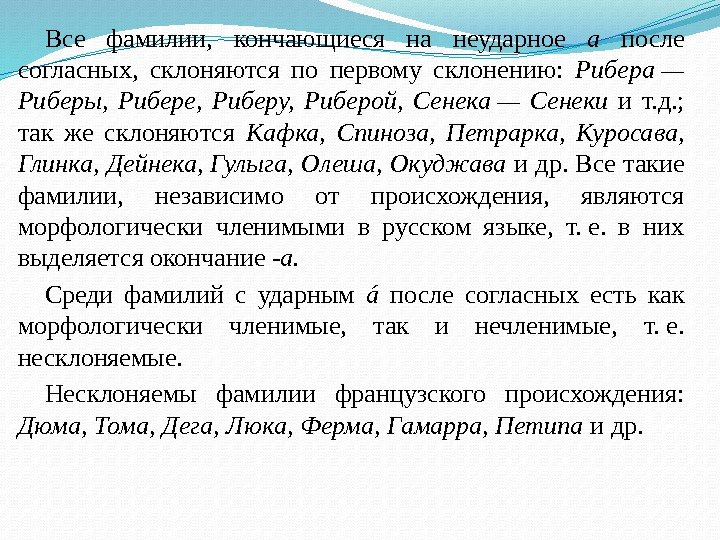 All surnames ending in an unstressed word and after consonants are declined according to the first declension: Ribera - Ribera, Ribera, Ribera, Ribera, Seneca - Seneca, etc.; Kafka, Spinoza, Petrarch, Kurosawa, Glinka, Deineka, Gulyga, Olesha, Okudzhava and others also incline. All such surnames, regardless of origin, are morphologically distinct in the Russian language, i.e. they have the ending -a. Among surnames with an accented á after consonants, there are both morphologically divisible and indivisible, i.e., indeclinable. The surnames are of French origin: Dumas, Thomas, Degas, Luca, Fermat, Gamarra, Petipa, etc.
All surnames ending in an unstressed word and after consonants are declined according to the first declension: Ribera - Ribera, Ribera, Ribera, Ribera, Seneca - Seneca, etc.; Kafka, Spinoza, Petrarch, Kurosawa, Glinka, Deineka, Gulyga, Olesha, Okudzhava and others also incline. All such surnames, regardless of origin, are morphologically distinct in the Russian language, i.e. they have the ending -a. Among surnames with an accented á after consonants, there are both morphologically divisible and indivisible, i.e., indeclinable. The surnames are of French origin: Dumas, Thomas, Degas, Luca, Fermat, Gamarra, Petipa, etc.
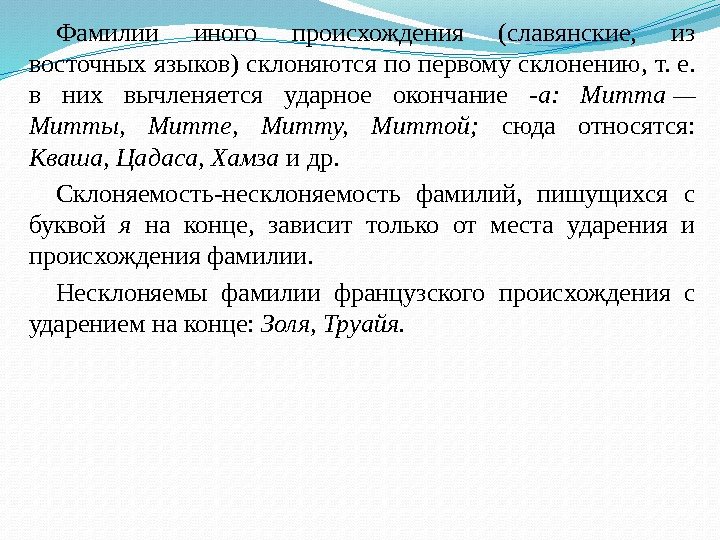 Surnames of other origins (Slavic, from eastern languages) are declined according to the first declension, that is, they have the stressed ending -a: Mitta - Mitty, Mitte, Mittu, Mittoy; these include: Kvasha, Tsadasa, Hamza, etc. The inclination-indeclinability of surnames written with the letter I at the end depends only on the place of emphasis and the origin of the surname. Surnames of French origin with an accent on the end are irreducible: Zola, Troyat.
Surnames of other origins (Slavic, from eastern languages) are declined according to the first declension, that is, they have the stressed ending -a: Mitta - Mitty, Mitte, Mittu, Mittoy; these include: Kvasha, Tsadasa, Hamza, etc. The inclination-indeclinability of surnames written with the letter I at the end depends only on the place of emphasis and the origin of the surname. Surnames of French origin with an accent on the end are irreducible: Zola, Troyat.
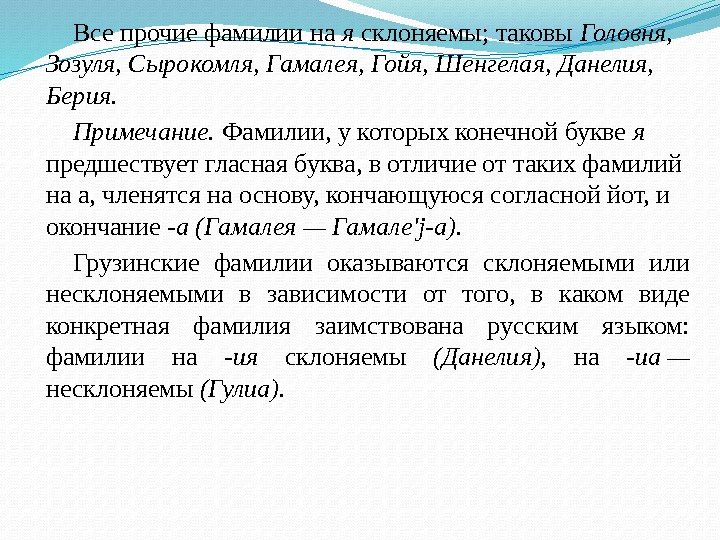 All other surnames are declined to i; these are Golovnya, Zozulya, Syrokomlya, Gamaleya, Goya, Shengelaya, Danelia, Beria. Note. Surnames in which the final letter i is preceded by a vowel, in contrast to such surnames ending in a, are divided into a stem ending with a consonant yot and the ending -a (Gamaleya - Gamale’j-a). Georgian surnames turn out to be indeclinable or indeclinable, depending on the form in which a particular surname is borrowed into the Russian language: surnames in -ia are indeclinable (Daneliya), in -ia - indeclinable (Gulia).
All other surnames are declined to i; these are Golovnya, Zozulya, Syrokomlya, Gamaleya, Goya, Shengelaya, Danelia, Beria. Note. Surnames in which the final letter i is preceded by a vowel, in contrast to such surnames ending in a, are divided into a stem ending with a consonant yot and the ending -a (Gamaleya - Gamale’j-a). Georgian surnames turn out to be indeclinable or indeclinable, depending on the form in which a particular surname is borrowed into the Russian language: surnames in -ia are indeclinable (Daneliya), in -ia - indeclinable (Gulia).
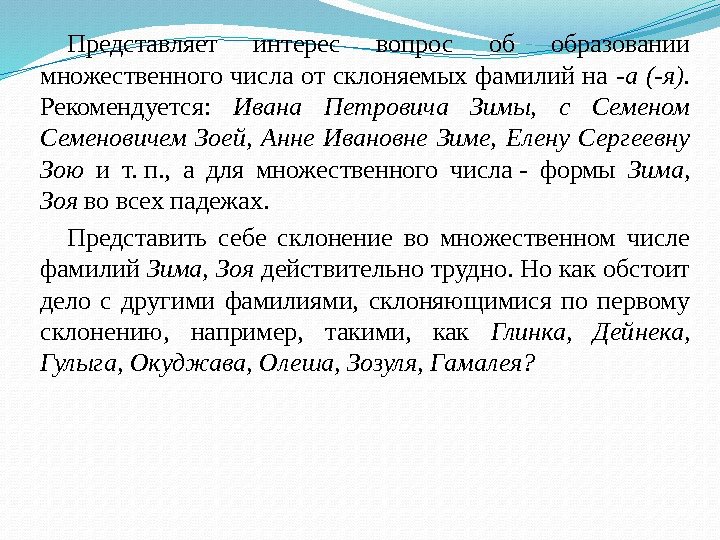 The question of the formation of the plural from declined surnames to -a (-я) is of interest. Recommended: Ivan Petrovich Zima, with Semyon Semenovich Zoya, Anna Ivanovna Zima, Elena Sergeevna Zoya, etc., and for the plural - the forms Zima, Zoya in all cases. It is really difficult to imagine the plural declination of the surnames Zima and Zoya. But what about other first declension surnames, for example, Glinka, Deineka, Gulyga, Okudzhava, Olesha, Zozulya, Gamaleya?
The question of the formation of the plural from declined surnames to -a (-я) is of interest. Recommended: Ivan Petrovich Zima, with Semyon Semenovich Zoya, Anna Ivanovna Zima, Elena Sergeevna Zoya, etc., and for the plural - the forms Zima, Zoya in all cases. It is really difficult to imagine the plural declination of the surnames Zima and Zoya. But what about other first declension surnames, for example, Glinka, Deineka, Gulyga, Okudzhava, Olesha, Zozulya, Gamaleya?
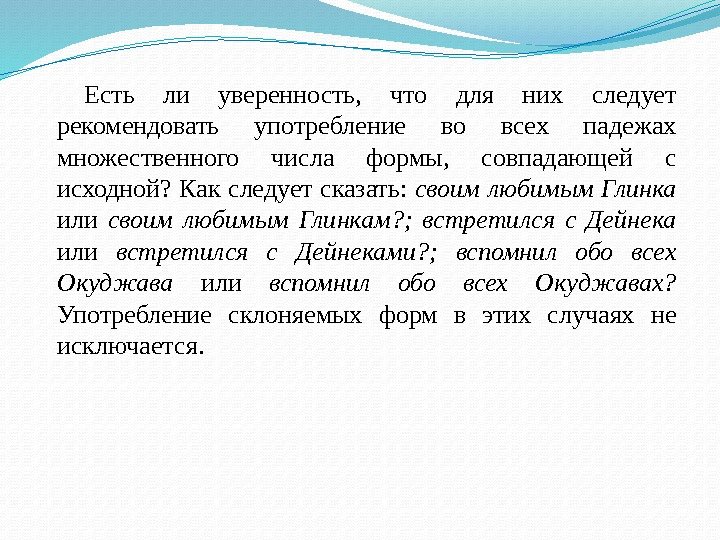 Is there any certainty that for them it should be recommended to use in all cases the plural form that coincides with the original one? How should you say: to your beloved Glinka or to your beloved Glinka? ; met with Deineka or met with the Deineks? ; remembered all the Okudzhavas or remembered all the Okudzhavas? The use of inflected forms in these cases is not excluded.
Is there any certainty that for them it should be recommended to use in all cases the plural form that coincides with the original one? How should you say: to your beloved Glinka or to your beloved Glinka? ; met with Deineka or met with the Deineks? ; remembered all the Okudzhavas or remembered all the Okudzhavas? The use of inflected forms in these cases is not excluded.

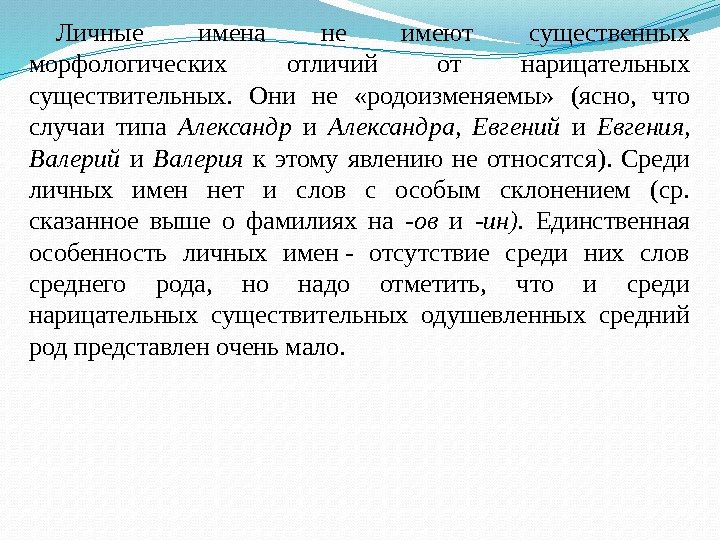 Personal names do not have significant morphological differences from common nouns. They are not “gender-changeable” (it is clear that cases such as Alexander and Alexander, Evgeniy and Evgeniya, Valery and Valeria do not belong to this phenomenon). Among personal names there are no words with a special declension (cf. what was said above about surnames with -ov and -in). The only peculiarity of personal names is the absence of neuter words among them, but it should be noted that among animate common nouns the neuter gender is represented very little.
Personal names do not have significant morphological differences from common nouns. They are not “gender-changeable” (it is clear that cases such as Alexander and Alexander, Evgeniy and Evgeniya, Valery and Valeria do not belong to this phenomenon). Among personal names there are no words with a special declension (cf. what was said above about surnames with -ov and -in). The only peculiarity of personal names is the absence of neuter words among them, but it should be noted that among animate common nouns the neuter gender is represented very little.
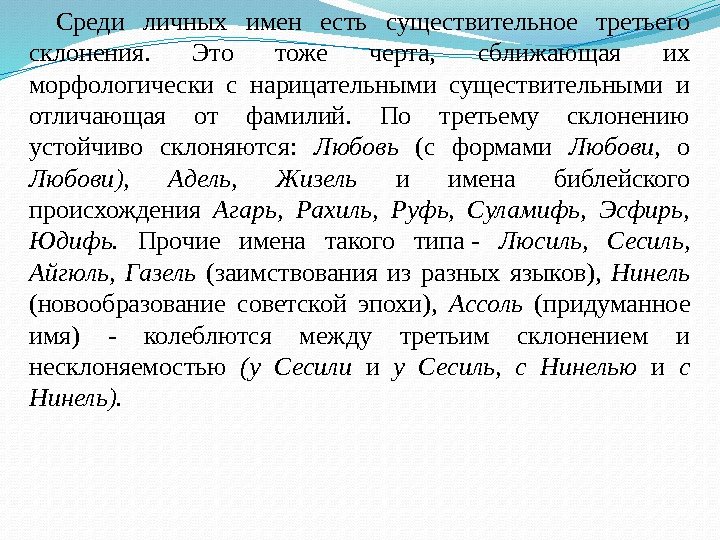 Among personal names there is a third declension noun. This is also a feature that brings them morphologically closer to common nouns and distinguishes them from surnames. According to the third declension, they are steadily inclined: Love (with the forms of Love, about Love), Adele, Giselle and names of biblical origin Hagar, Rachel, Ruth, Shulamith, Esther, Judith. Other names of this type - Lucille, Cecil, Aigul, Gazelle (borrowings from different languages), Ninel (a new formation of the Soviet era), Assol (invented name) - fluctuate between the third declension and indeclinability (in Cecil and in Cecil, with Ninel and with Ninel ).
Among personal names there is a third declension noun. This is also a feature that brings them morphologically closer to common nouns and distinguishes them from surnames. According to the third declension, they are steadily inclined: Love (with the forms of Love, about Love), Adele, Giselle and names of biblical origin Hagar, Rachel, Ruth, Shulamith, Esther, Judith. Other names of this type - Lucille, Cecil, Aigul, Gazelle (borrowings from different languages), Ninel (a new formation of the Soviet era), Assol (invented name) - fluctuate between the third declension and indeclinability (in Cecil and in Cecil, with Ninel and with Ninel ).
 Note. Women's surnames with soft consonants (written in ь) are just as indeclinable as women's surnames with hard consonants. The fundamentally existing possibility of parallel change of nouns into soft consonants in two different declensions for the grammatical expression of gender differences remains unrealized in the Russian language. Wed. theoretically possible relationships: Vrubel, Vrubel, Vrubel (declension of a male surname) - *Vrubel, *Vrubel (declension of a female surname), *lynx, *lynx, *lynx (declension of the name of a male) -lynx, trot (declension of the name of a female). However, in the famous folklore Swans this possibility is partially realized!
Note. Women's surnames with soft consonants (written in ь) are just as indeclinable as women's surnames with hard consonants. The fundamentally existing possibility of parallel change of nouns into soft consonants in two different declensions for the grammatical expression of gender differences remains unrealized in the Russian language. Wed. theoretically possible relationships: Vrubel, Vrubel, Vrubel (declension of a male surname) - *Vrubel, *Vrubel (declension of a female surname), *lynx, *lynx, *lynx (declension of the name of a male) -lynx, trot (declension of the name of a female). However, in the famous folklore Swans this possibility is partially realized!
 Female names with strong consonants can only be indeclinable (no different from surnames of this kind). These include: Elizabeth, Irene, Catherine, Gretchen, Liv, Solveig, Marlene, Jacqueline, etc. There are common nouns of this type, but they are few in number and are practically not replenished (Madame, Mrs., Mistress, Fraulein, Miss), personal there are many names and their replenishment (by borrowing) is not limited by anything.
Female names with strong consonants can only be indeclinable (no different from surnames of this kind). These include: Elizabeth, Irene, Catherine, Gretchen, Liv, Solveig, Marlene, Jacqueline, etc. There are common nouns of this type, but they are few in number and are practically not replenished (Madame, Mrs., Mistress, Fraulein, Miss), personal there are many names and their replenishment (by borrowing) is not limited by anything.
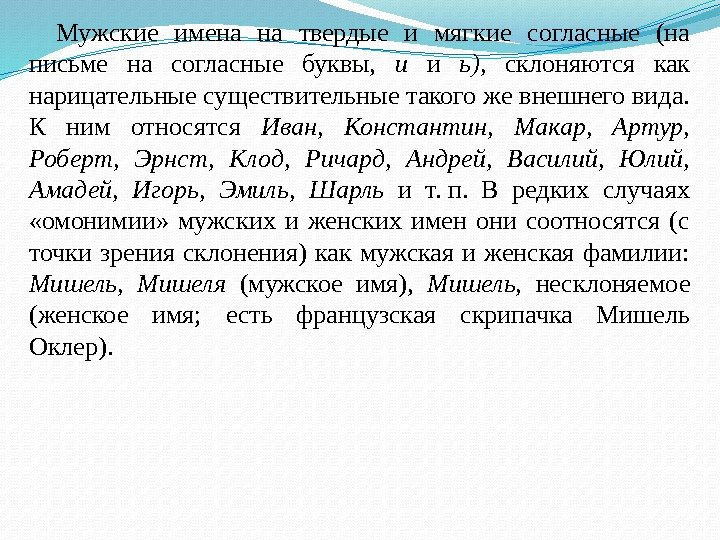 Male names with hard and soft consonants (in writing with consonant letters, i and ь), are declined as common nouns of the same appearance. These include Ivan, Konstantin, Makar, Arthur, Robert, Ernst, Claude, Richard, Andrey, Vasily, Julius, Amadeus, Igor, Emil, Charles, etc. In rare cases of “homonymy” of male and female names, they correspond ( from the point of view of declension) as male and female surnames: Michel, Michela (male name), Michel, indeclinable (female name; there is a French violinist Michel Auclair).
Male names with hard and soft consonants (in writing with consonant letters, i and ь), are declined as common nouns of the same appearance. These include Ivan, Konstantin, Makar, Arthur, Robert, Ernst, Claude, Richard, Andrey, Vasily, Julius, Amadeus, Igor, Emil, Charles, etc. In rare cases of “homonymy” of male and female names, they correspond ( from the point of view of declension) as male and female surnames: Michel, Michela (male name), Michel, indeclinable (female name; there is a French violinist Michel Auclair).

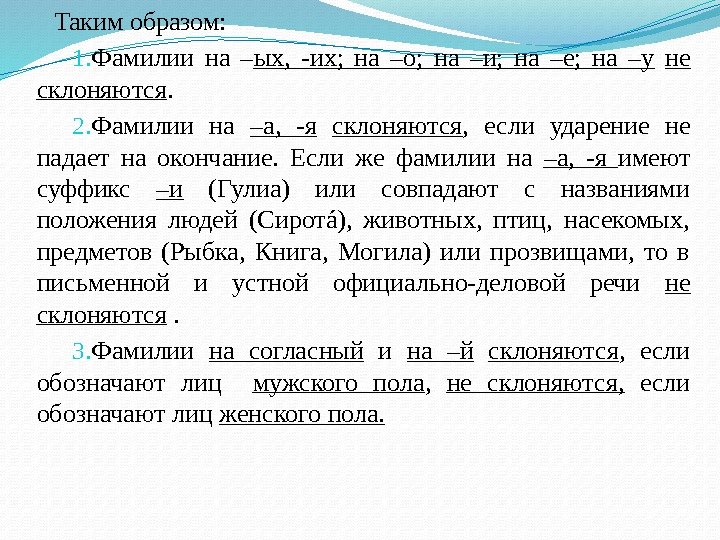 Thus: 1. Surnames with – х, -и; on –o; na –i; on –e; they don’t decline to –u. 2. Surnames ending in -a, -ya are declined if the emphasis does not fall on the ending. If surnames starting with -a, -ya have the suffix -i (Gulia) or coincide with the names of the position of people (Sirota), animals, birds, insects, objects (Fish, Book, Grave) or nicknames, then in written and oral official business speech don't bow down. 3. Surnames with a consonant and -y are declined if they denote males, but not if they denote females.
Thus: 1. Surnames with – х, -и; on –o; na –i; on –e; they don’t decline to –u. 2. Surnames ending in -a, -ya are declined if the emphasis does not fall on the ending. If surnames starting with -a, -ya have the suffix -i (Gulia) or coincide with the names of the position of people (Sirota), animals, birds, insects, objects (Fish, Book, Grave) or nicknames, then in written and oral official business speech don't bow down. 3. Surnames with a consonant and -y are declined if they denote males, but not if they denote females.
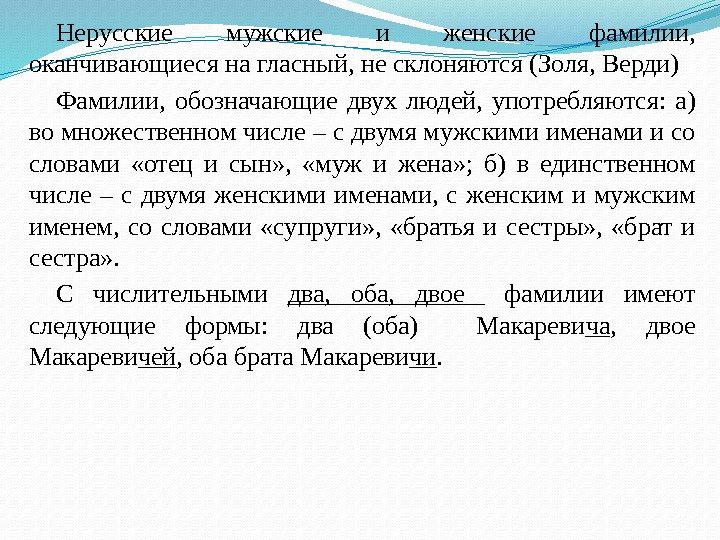 Non-Russian male and female surnames ending in a vowel are not declined (Zola, Verdi) Surnames denoting two people are used: a) in the plural - with two male names and with the words “father and son”, “husband and wife”; b) in the singular - with two female names, with feminine and male name, with the words “spouses”, “brothers and sisters”, “brother and sister”. With the numerals two, both, two, surnames have the following forms: two (both) Makarevichs, two Makarevichs, both brothers Makarevichs.
Non-Russian male and female surnames ending in a vowel are not declined (Zola, Verdi) Surnames denoting two people are used: a) in the plural - with two male names and with the words “father and son”, “husband and wife”; b) in the singular - with two female names, with feminine and male name, with the words “spouses”, “brothers and sisters”, “brother and sister”. With the numerals two, both, two, surnames have the following forms: two (both) Makarevichs, two Makarevichs, both brothers Makarevichs.
The experience of our “Reference Bureau” shows that the laws of declension of surnames are indeed unknown to a large number of native speakers (and even some philologists), although they are given in many reference books on the Russian language, including widely available ones. Among these manuals are “Handbook of the Russian language: spelling, pronunciation, literary editing” by D. E. Rosenthal, E. V. Dzhandzhakova, N. P. Kabanova, a stylistic dictionary of variants by L. K. Graudina, V. A. Itskovich , L.P. Katlinskaya “Grammatical correctness of Russian speech”, “Dictionary of Russian personal names” by A.V. Superanskaya, research by L.P. Kalakutskaya “Surnames. Names. Middle names. Spelling and their declension" and many other sources. A study of the requests of Internet users and monitoring of the blogosphere allows us to conclude: there are many misconceptions among native speakers regarding the rules of declension of surnames. Here are the main ones: the decisive factor is the linguistic origin of the surname (“Georgian, Armenian, Polish, etc. surnames are not declined”); in all cases, the declension of the surname depends on the gender of the bearer; surnames that coincide with common nouns (Thunderstorm, Beetle, Stick), do not bow. A considerable number of native speakers are convinced that there are so many rules for declension of surnames that it is not possible to remember them.
To show that all these ideas do not correspond to reality, we present the basic rules for declension of surnames. They are taken from the sources listed above and formulated by us in the form step by step instructions, a kind of algorithm with which you can quickly find the answer to the question: “Does the surname decline?”
This is the algorithm.
1. As stated above, declension of surnames ending in -ov (-ev,), -in (-yn), -sky (-tsky), i.e., so-called standard surnames, does not cause difficulties for native speakers. You just need to remember two important rules.
A. Borrowed surnames -ov, -in which belong foreigners, in the form of the instrumental case they have an ending -ohm(as nouns of the second school declension, for example table, table): the theory was proposed by Darwin, the film was directed by Chaplin, the book was written by Cronin.(Interestingly, the pseudonym is also inclined Green, owned by a Russian writer: the book has been written Green.) Homonymous Russian surnames have the ending - th in the instrumental case: with Chaplin(from the dialect word Chaplya"heron"), with Kronin(from crown).
B. Women's surnames starting with - ina type Currant, Pearl Declined in two ways, depending on the declension of the male surname ( Irina Zhemchuzhina And Irina Zhemchuzhina, Zoya Smorodina And Zoya Smorodina). If male surname – Zhemchuzhin, then correct: arrival Irina Zhemchuzhina. If the man's surname is Pearl, then correct: arrival Irina Zhemchuzhina(surname is declined as a common noun pearl).
2. Now we move directly to the so-called non-standard surnames. The first thing to remember: contrary to popular misconception, the gender of the bearer of a surname does not always influence whether one is inclined or not. Even less often, this is influenced by the origin of the surname. First of all, it matters what sound the surname ends with - a consonant or a vowel.
3. Let us immediately describe several groups of indeclinable surnames. In modern Russian literary language don't bow Russian surnames, ending in -ы, -и(type Black, Long), as well as all surnames, ending in vowels e, i, o, u, y, e, yu. Examples: notebooks of Irina Chernykh, Lydia Meie, Roman Grymau; the diploma was issued to Viktor Dolgikh, Andrey Gretry, Nikolai Shtanenko, Maya Lee; meeting with Nikolai Kruchenykh and Svetlana Busset.
Note. In colloquial speech and in language fiction, reflecting oral speech, it is considered acceptable to decline male surnames to - oh, -them (in Chernykh’s script, meeting with Kruchenykh), as well as the declination of surnames of Ukrainian origin to -ko, -enko according to the declension of feminine nouns -a: go to Semashka, visiting Ustimenka.
4. If the surname ends in a consonant(except surnames on -y, -them, which were mentioned above), then here – and only here! – the gender of the bearer of the surname matters. All male surnames ending in a consonant are declined - this is the law of Russian grammar. All female surnames ending in a consonant are not declined. In this case, the linguistic origin of the surname does not matter. Male surnames that coincide with common nouns are also declined.
Examples: notebook by Mikhail Bok, diplomas issued to Alexander Krug and Konstantin Korol, meeting with Igor Shipelevich, visiting Andrei Martynyuk, daughter of Ilya Skalozub, work by Isaac Akopyan; Notebook by Anna Bok, diplomas issued to Natalya Krug and Lydia Korol, meeting with Yulia Shipelevich, visiting Ekaterina Martynyuk, daughter of Svetlana Skalozub, work by Marina Akopyan.
Note 1. Male surnames of East Slavic origin, which have a fluent vowel during declination, can be declined in two ways - with and without loss of the vowel: Mikhail Zayats And Mikhail Zaits, with Alexander Zhuravel And Alexander Zhuravl, Igor Gritsevets And Igor Gritsevets. In a number of sources, declension without dropping a vowel is considered preferable (i.e. Hare, Crane, Gritsevets), since surnames also perform a legal function. But the final choice is up to the bearer of the surname. It is important to adhere to the chosen type of declination in all documents.
Note 2. Separately, it is necessary to say about surnames ending in a consonant y. If preceded by a vowel And(less often - O), the surname can be declined in two ways. Surnames like Topchiy, Pobozhiy, Bokiy, Rudoy, can be perceived as having endings -yy, -yy and decline as adjectives ( Topchego, Topchego, feminine Topchaya, Topchey), or it is possible - as having a zero ending with declension modeled on nouns ( Topchiya, Topchiya, feminine invariant form Topchy). If you agree th at the end of the surname preceded by any other vowel, the surname is subordinated general rules (Igor Shakhrai, Nikolai Adzhubey, But Inna Shakhrai, Alexandra Adzhubey).
5. If the surname ends in a vowel -я preceded by another vowel(eg: Shengelaya, Lomaya, Rhea, Beria, Danelia), she leans.
Examples: Inna Shengelai's notebook, diploma given to Nikolai Lomaya, meeting with Anna Reya; crimes of Lavrentiy Beria, meeting with Georgy Danelia.
6. If the surname ends in a vowel -a preceded by another vowel(eg: Galois, Maurois, Delacroix, Moravia, Eria, Heredia, Gulia), she doesn't bow. Examples: notebook Nikolai Galois, diploma issued to Irina Eria, meeting with Igor Gulia.
A. Don't bow French surnames with emphasis on the last syllable: books by Alexandre Dumas, Emile Zola and Anna Gavalda, goals by Diarra and Drogba.
B. Mostly don't bow Finnish surnames ending in - A unstressed: meeting with Mauno Pekkala(although a number of sources recommend inclining them too).
All other surnames (Slavic, eastern and others; ending in stressed and unstressed -and I) bow down. Contrary to popular belief, surnames that coincide with common nouns are also declined.
Examples: notebook by Irina Groza, diploma issued to Nikolai Mukha, lecture by Elena Kara-Murza, songs by Bulat Okudzhava, roles by Igor Kvasha.
Note. There are fluctuations in declination Japanese surnames, but reference manuals note that in Lately such surnames are sequentially declined: Kurosawa films.
That, in fact, is all the main rules; as you can see, there are not so many of them. Now we can refute the misconceptions listed above related to the declination of surnames. So, contrary to popular belief: a) there is no rule “all Armenian, Georgian, Polish, etc. surnames are not declined” - the declension of surnames is subject to the laws of language grammar, and if the final element of the surname is amenable to Russian inflection, it is declined; b) the rule “men's surnames are declined, women's are not” does not apply to all surnames, but only to those that end in a consonant; c) the coincidence of the surname in form with common nouns is not an obstacle to their declension.
It is important to remember: the surname is word and, like all words, it must obey the grammatical laws of the language. In this sense there is no difference between the sentences The certificate was issued to Ivan Golod(instead of the correct Golodu Ivan) And The villagers suffered from hunger(instead of suffered from hunger), there is a grammatical error in both sentences.
It is also important to follow the rules for declension of surnames because refusal to change according to cases declining surname can lead to misunderstandings and incidents, disorienting the addressee of the speech. In fact, let’s imagine the following situation: a person with the surname Storm signed his work: article by Nikolai Groz. According to the laws of Russian grammar, a man's surname ending in the genitive case singular. numbers on - A, is restored in its original form, in the nominative case, with a zero ending, so the reader will make an unambiguous conclusion: the author’s name is Nikolai Groz. Submitted to the dean's office work by A. Pogrebnyak will lead to the search for the student (Anna? Antonina? Alisa?) Pogrebnyak, and the student Alexander Pogrebnyak’s belonging to her will still need to be proven. It is necessary to follow the rules of declension of surnames for the same reason that it is necessary to follow the rules of spelling, otherwise a situation arises similar to the famous “opteka” described by L. Uspensky in “A Lay on Words.”
Therefore, we invite you to remember elementary truth No. 8.
Basic Truth No. 8. The declension of surnames is subject to the laws of Russian grammar. There is no rule “all Armenian, Georgian, Polish, etc. surnames are not declined.” The declension of a surname depends primarily on what sound the surname ends with - a consonant or a vowel. The rule “men's surnames are declined, women's are not” does not apply to all surnames, but only to those that end in consonant. Matching of the surname in form with common nouns (Fly, Hare, Stick etc.) is not an obstacle to their inclination.
Literature:
Ageenko F. L. Dictionary of proper names of the Russian language. M., 2010.
Graudina L.K., Itskovich V.A., Katlinskaya L.P. Dictionary of grammatical variants of the Russian language. –3rd ed., erased. M., 2008.
Kalakutskaya L.P. Surnames. Names. Middle names. Spelling and Declension. M., 1994.
Rosenthal D. E., Dzhandzhakova E. V., Kabanova N. P. Handbook of the Russian language: spelling, pronunciation, literary editing. – 7th ed. M., 2010.
Superanskaya A.V. Dictionary of Russian personal names. M., 2004.
V. M. Pakhomov,
Candidate of Philology,
editor-in-chief of the portal GRAMOTA.RU